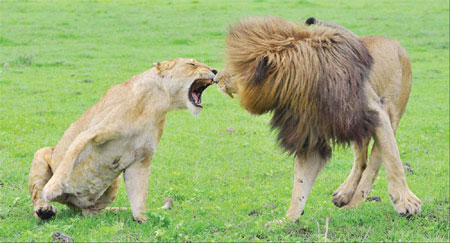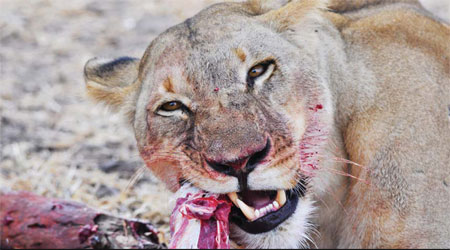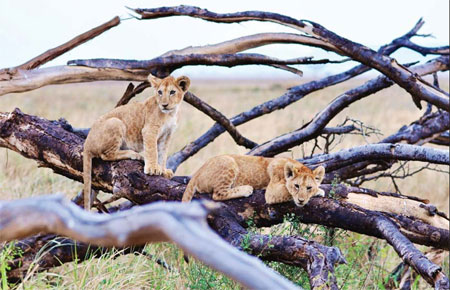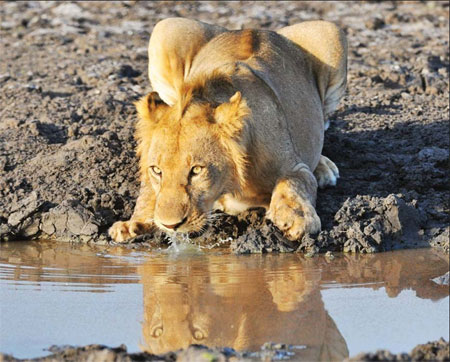| About Hubei | Culture & Arts | ||
| Attractions | Routes | ||
| Dining | Shopping | ||
| Hotels | Transportation | ||
| Entertainment | Travel agencies |
Jingshan to attract Wuhan tourists
Storytelling queen
For the love of Wuhan
Dangyang to promote tourism


China's lion king
By Deng Zhangyu (China Daily)
Updated: 2013-09-21
One young man has turned a boyhood dream into a career
When Chen Jianxing stops his off-road vehicle about 5 meters from the lioness he calls Lisa, it comes close, rubbing its body against his car to scratch an itch. Sometimes, the lioness, which Chen has tracked for years, even lies under his vehicle to avoid the scorching sun, leaving only its tail exposed.
Chen's vehicle has no roof. It would be quite easy for Lisa to jump into the car and attack Chen, but he knows Lisa will never do that.
"Lions seldom attack men. They don't eat humans, despite what the media say," says Chen, who has passionately tracked the pride Lisa is in for two years. From the end of 2010 to 2012, Chen tracked the Manze pride along Lake Manze in the Selous Game Reserve in southern Tanzania.
Chen is a diehard lion lover, and he often spends several days and nights watching the Manze pride. He has seen how a lion from another pride defeated the lion king in the Manze pride to claim his crown. He has also seen Lisa lead the pride in hunting prey.
"I feel quite comfortable staying with the pride," says the 35-year-old from Wuhan, Hubei province.
Usually, lions sleep more than 20 hours a day. Only in the mornings and evenings do they move around and hunt for their prey. Chen says when the lions sleep under a tree, he also sleeps in his open car a few meters away.
Chen has lived in Tanzania for seven years, and now works for the Tanzania National Parks. The reason is that the job enables him to watch lions without any limitations. Previously, he was a diplomat at the Chinese embassy in Dar es Salaam, Tanzania.
"Chen loves lions. It's rare to combine one's job with one's interest. He is an idealist," says Allen Kijazi, the head of Tanzania National Parks.
Watching lions in Tanzania on TV was Chen's childhood obsession. When he was in primary school, he loved loved watching programs about nature and wildlife. Soon after, he fell in love with lions, although all he learnt came from TV.
"When I was a little boy I made a wish that one day I would go to Tanzania and see real lions," he says.
At 15, Chen spent six months writing the draft of a book about an imaginary lion living in the Serengeti National Park in northern Tanzania. This year a book he wrote on the life of the Manze pride was published in China. It included many of his own photos.
"In the 1990s, most Chinese people knew very little about Africa, but I saw so much of it and collected so much material that it felt like my second hometown," Chen says.
In 2010, Chen started his new job working for the Tanzania National Parks' new project in the Selous Game Reserve. Selous is one of the largest mammal reserves in the world and is home to about 4,000 lions.
Chen's workplace is a 40-minute drive from Lake Manze in the Selous. There for the first time, he met the Manze pride of 14 lions. It took about two months for the pride to become familiar with him. In that time, he gave a name to each lion.
Lisa was then a 10-year-old mother of two cubs. The average life span for a lioness is about 12 to 15 years. With strangers, says Chen, Lisa often roars and shows her sharp teeth, warning them not to come too close. But she allows Chen to come to within 5 meters, sometimes even closer.
Generally, tourists and safari walkers have bodyguards with them. But Chen often sleeps alone in his camp, with lions walking by outside, roaring.
"I felt horrible the first time, but I quickly got used to it. I don't believe they will hurt me. And that's proved to be true."
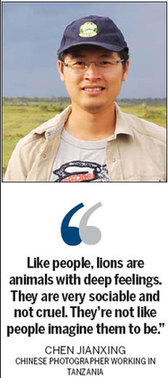
Chen has seen Lisa attack and defeat intruders who have wanted to eat her cubs. He says some stray brother lions will never abandon each other, even when facing a threat to their life.
"Like people, lions are animals with deep feelings. They are very sociable and not cruel. They're not like people imagine them to be," Chen says.
It is true that there are a few lions that will attack humans. Most of these lions cannot catch wildlife and will attack if people confront them, Chen says.
Because he regularly visits Lake Manze, he is often required to help other organizations by providing photos for them and creating profiles for each lion, just like a person's identity card. This was how Chen met Craig Packer, an ecologist who has spent 40 years studying lions in Africa.
"I want to do my doctorate with Craig in the future, to deepen my knowledge of lions," Chen says.
As an employee of Tanzania National Parks, Chen is also interested in animal conservations, especially wildlife poaching.
Elephant poaching is rampant in Africa due to increasing global demand on the black market. The national parks need money to hire more rangers and equip them against poachers, Chen says.
Chen says the Selous Game Reserve is three times larger than the Serengeti National Park. However, the former has only 300 rangers while the latter has more than 1,000.
Chen says many rangers in Tanzania want to learn Chinese martial arts, such as free combat, to fight against poachers.
"I go back to China to raise money and work with Chinese NGOs to call for people not to buy elephant tusks," says Chen, who returned to China early this month.
Talking about his plans, Chen says he will continue watching the mighty animals, and will fly between China and Tanzania to promote animal protection for his second hometown.
dengzhangyu@chinadaily.com
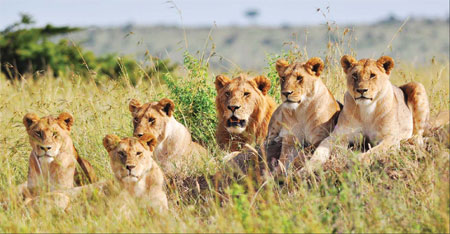
|
In his pictures, Chen Jianxing has captured lions at rest, eating and letting off a bit of steam. Photos Provided to China Daily by Chen Jianxing |
